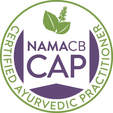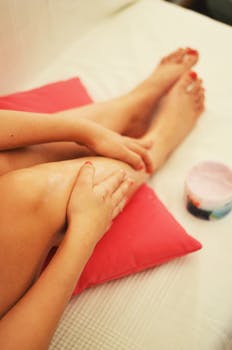Pitta type skin tends to be oily, sensitive, and red, inflamed, freckled, has moles or freckles, is sweaty and warm, and is prone to acne, rashes, and rosacea. Kapha type skin tends to be cool, heavy, thick, oily, clammy and moist, and is prone to lots of oiliness, clogged pores and eczema. Good choices are sesame or almond oil for vata, sunflower or coconut oil for pitta and sesame or corn oil for kapha. For vata you can add warm and calming essential oils such as lavender, jasmine and frankincense. For pitta add cooling and soothing scents like khus, rose and sandalwood. And for kapha you might choose warming and spicy scents like lemon, bergamot and rosemary. If you do not know your constitution or imbalance, you can simply mix equal parts organic sunflower and sesame oils together and use that. If desired you can add a few drops of sandalwood, chamomile or lavender essential oil for a calming effect, juniper, citrus or bergamot to enliven you.
To do Abhyanga, fill a small squeeze bottle with oil, and warm it by putting it in a bowl of warm water. I actually use a cruet with a spout because I prefer to avoid plastic. Begin by massaging your scalp and gently massage your face, temples and backs of the ears. Put a little on your pinkie and dab the oil into your ears. Use a circular motion on your joints and back and forth motions on the long bones. Use large, gentle, circular and clockwise motions on your trunk. End by lovingly massaging your feet. If you find any sore spots, spend an extra minute massaging that area. When you have finished applying the oil, sit and relax for a few minutes. This is a great time to do a brief meditation. After at least 5 minutes you can use an old washcloth to dab off excess oil just prior to getting into the shower. If you have time, leave the oil on for a longer time. Rub the oil off the bottoms of your feet so that you do not slip. Alternatively, you can take a little chickpea flour and gently rub it on your skin to absorb the excess oil. In the shower, it is not necessary to use soap to wash off the oil. You only need to use soap on the smellier parts of your body or if you have actual dirt on your skin. Let the warm water help your skin absorb the healing benefits of the oil. If you do not have time to do a full body massage, you can still benefit by giving yourself a mini-massage to your scalp, face, hands and feet. This is good to do either before your shower, or just before bed. Ayurveda offers an abundance of different herbal oils to use for Abhyanga. I’d like to highlight a few of my favorite oils that I frequently suggest. Banyan Botanicals Daily Massage Oil is a good place to start. It is a good choice when constitution is unknown and is balancing for all constitutions and imbalances. It rejuvenates the body and calms the mind. Mahanarayan oil can be used diluted half and half with a base like sunflower oil for a whole body massage and is excellent for vata muscle pain, soreness and inflammation. I use it full strength on specific areas of soreness and muscle aches. I have also found it to be an excellent oil to apply to the legs to deter chiggers and ticks when walking in an area known to have them. Neem Oil is another favorite which is especially useful for inflammatory types of skin troubles such as certain types of acne, fungal infections, eczema, psoriasis and dermatitis. It contains neem which is antimicrobial and promotes the immune system of the skin. Apply the neem oil to the affected areas at the beginning of your massage and use simple base oil for the rest of your body. Sleep Easy Oil or Brahmi Oil nourishes and soothes the mind, relieves stress and tension and helps provide a restful night’s sleep. They are both excellent to massage onto the soles of your feet and to your scalp before bed. A bedtime massage is also very lovely to do with a friend or with family. Ayurveda views each person as completely unique and treatments are customized to each individual’s constitution and skin type. To learn more about your constitution and what is specifically best for your own health, consider scheduling an Ayurvedic consultation. In this way you will discover what the best practices are for you and learn how to use your inherent strengths and nourish your challenging areas. I hope you add Abhyanga to your daily routine. I have found it to be comforting and revitalizing at the same time. Be well and smile often, Shivani It is always recommended that clients work with their physicians for routine medical care and treatment of illness. Check with your doctor before taking herbs or using essential oils, especially when pregnant or nursing.
1 Comment
|
Affiliate LinksSome of the links provided are affiliate links, which cost you nothing, but pay me a small commission to help support my little blog. Disclaimer
I am certified as an Ayurvedic Practitioner. I am not a medical doctor nor a dietitian, and I do not diagnose, treat or cure disease. My articles are not a substitute for medical advice. It is always recommended that clients work with their physicians for routine medical care and treatment of illness. Check with your doctor before taking herbs or using essential oils, especially when pregnant or nursing.
Please read my full Disclaimer. Archives
September 2021
|

Contact: [email protected] [email protected] 918-457-9315
© 2021 Balanced Life Ayurveda, LLC All Rights Reserved
Disclaimer

 RSS Feed
RSS Feed